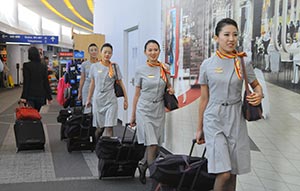

Brain drain
Wang said the current outflow of talents is having a negative impact on economic growth, as the outflowing talents are not only taking away large sums of money, but also their creativity, which has been seen as necessary for China's future development.
China ranked 34th among 141 countries and regions in the 2012 Global Innovation Index published by the World Intellectual Property Organization.
The lack of talents will also hinder trade with foreign countries, said Lin Guan, president of Guangxi Investment Group Co Ltd.
Lin said it is hard to start business programs in Guangxi because there are not enough local talent resources in the finance, trade and export fields, which makes it hard to do business with ASEAN member countries.
The 2013 China Private Wealth Report showed that a large number of entrepreneurs are leaving China as well, said Huang Zhiyong, deputy dean of the Guangxi Academy of Social Sciences.
"With entrepreneurs going leaving and a lack of new incoming foreign investors, China's employment will take a big hit," he said.
Although the government is using multiple programs and favorable polices to lure domestic talents back, experts said the measures are not ideal.
"Most of those who come back are going to colleges and research institutions instead of companies, so they are not necessarily helping the economy," said Yuan Chiping, deputy director of the Center for Studies of Hong Kong, Macao and the Pearl River Delta at Sun Yat-sen University.
Chinese universities have comparatively high requirements in regards to how many thesis publications researchers must write. Those who fail to meet the requirements are expelled. This pressure inevitably scares some returning talents away, Yuan said.
The government's efforts are focused too much on material conditions such as housing and salaries while largely ignoring the support facilities and good research environment that have led more talents to other countries, Yuan said.
At a time when more talented people are flowing outside, experts said China needs to make a strategic change to lure them back.
Wang said the government should work with enterprises and NGOs to bring in more talents, adding that head-hunting agencies should be set up in foreign countries in order to locate talents.
Yuan said higher learning institutions in China should be more flexible when it comes to the number of theses their researchers must publish, as this will allow researchers to conduct their research more attentively.
He said that China should enhance the protection of intellectual property rights to encourage more innovation, rather than allowing counterfeit products to thrive.
A long-term mechanism should be established where laws and regulations are in place, innovation is encouraged and the environment for starting businesses is suitable, Yuan said.
"Such a mechanism will help China retain talented people and contribute to its future development," he added.
 Models at Ford pavilion at Chengdu Motor Show
Models at Ford pavilion at Chengdu Motor Show
 Brilliant future expected for Chinese cinema: interview
Brilliant future expected for Chinese cinema: interview
 Chang'an launches Eado XT at Chengdu Motor Show
Chang'an launches Eado XT at Chengdu Motor Show
 Hainan Airlines makes maiden flight to Chicago
Hainan Airlines makes maiden flight to Chicago
 Highlights of 2013 Chengdu Motor Show
Highlights of 2013 Chengdu Motor Show
 New Mercedes E-Class China debut at Chengdu Motor Show
New Mercedes E-Class China debut at Chengdu Motor Show
 'Jurassic Park 3D' remains atop Chinese box office
'Jurassic Park 3D' remains atop Chinese box office
 Beauty reveals secrets of fashion consultant
Beauty reveals secrets of fashion consultant